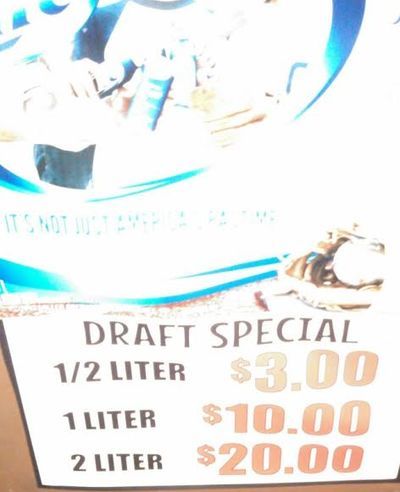Happy hour prices Part-2
 A bar is offering greatly reduced prices on their draft beer during their happy hour. (See above image for menu prices)
A bar is offering greatly reduced prices on their draft beer during their happy hour. (See above image for menu prices)
If a group of friends decide that they want to drink a total of 10 liters, how much would it cost them(maximum price)?
Try the previous version too! Also, if you would like to have some fun read this !!!
This section requires Javascript.
You are seeing this because something didn't load right. We suggest you, (a) try
refreshing the page, (b) enabling javascript if it is disabled on your browser and,
finally, (c)
loading the
non-javascript version of this page
. We're sorry about the hassle.
2 solutions
@Prasun Biswas See whether my notation is improved or not :P
Log in to reply
Although, there's one thing I'd like to point out. You said:
We see that Γ i ∝ φ i and Γ i is maximum when φ i is maximum , since δ is fixed.
This part is actually trivial and doesn't require to be "observed" because it follows from the definition of "being proportional to". What I mean to say is, we have, by definition,
x ∝ y ⟺ x = δ y where δ is some constant (fixed value)
I'm truly impressed. Upvoted! :)
@Brilliant Mathematics What do you think about my solution?
If they ordered the 2 liter 5 times, they will get to drink 1 0 liters fo $ 1 0 0
Or, If they ordered the 1 liter 1 0 times, it won't differ.
There are many more ways to buy 1 0 Liters for the condition in the question. Hint: Use permutations and combinations!
Bonus question: Write an essay expounding the woes of a customer who did not learn mathematics.
Moderator note:
How do you know that there isn't a combination order ("many more ways) that could end up costing more?
We define a term ϕ ( x ) = x litres cost .
ϕ ( 0 . 5 ) = 0 . 5 3 = 6 = φ 1 ϕ ( 1 ) = 1 1 0 = 1 0 = φ 2 ϕ ( 2 ) = 2 2 0 = 1 0 = φ 3
We can see that φ 1 < φ 2 = φ 3 , We will have the maximum price when we use φ 2 , φ 3 to determine the maximum price.
We define Γ i = φ i δ ∀ i 1 ≤ i ≤ 3 where δ is the number of liters of drink ordered. We see that Γ i ∝ φ i and Γ i is maximum when φ i is maximum , since δ is fixed.So we have:
Γ i ( m a x ) = φ i ( m a x ) δ = φ ( 2 , 3 ) δ = 1 0 × 1 0 = 1 0 0
Bonus question: Write an essay expounding the woes of a customer who did not learn mathematics.